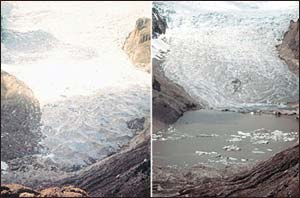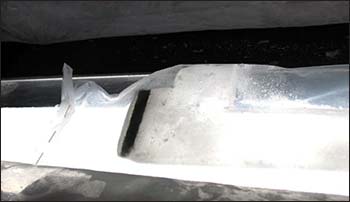|

Science loses out when
ice caps melt
It's hard to imagine a mountain range without snow-covered peaks. But
that may soon be the case in countries in or near the tropics. Studies
show that the ice that sits atop the world's highest mountains is
vanishing at an alarming rate, threatening to leave the summits bare.
The accelerated melting of these glacial caps is visible evidence that
Earth is getting warmer, scientists say.
|

At left is Peruís Qori Kalis glacier in 1978, when it was still
healthy. At right is the much reduced glacier in 2000. |
Most of Earth's glaciers have been shrinking for decades as our
climate has been warming from natural causes and human activity.
Although Earth's atmosphere is warming nearly everywhere, the greatest
warming has been taking place at high elevations and in tropical
portions of the world, says Lonnie Thompson, a glaciologist" or
scientist who studies glaciers" at Ohio State University.In very high
tropical glaciers, temperatures have been warming at three times the
speed of increases at ground level. Most mountain peaks are high enough
that the snow that falls onto them will stay frozen year-round. That's
because air at high altitudes is less dense and holds less heat. As the
snow piles higher and higher, the bottom layers become compressed into
ice, forming a glacier," a slowly moving river of ice.
For scientists, the real beauty of glaciers is that there's so little
melting. A year's worth of snow can be crunched down to form an annual
layer that normally survives hundreds 'if not thousands' of years.
Essentially the deeper you probe down into a glacier's ice, the farther
back in time you get. Those annual ice layers they're like tree rings,
says Thompson, who has travelled the world, measuring the shrivelling
snowcaps atop some of the world's highest mountains.
His studies show that the huge Quelccaya (Kal Kiyah) Ice Cap, a
tropical glacier that stretches across the Peruvian Andes, is
shrivelling by about 18 inches a day. "You can almost sit there and
watch it lose ground, Thompson says. Another glacier one that sits atop
Mount Kilimanjaro in Tanzania" has been melting steadily for nearly 100
years and has lost 84 per cent of its ice. Like tree rings, the layers
found in glaciers also have an important story to tell. Because
snowpacks absorb chemicals, pollen and dust from the atmosphere, the ice
masses that sit atop mountains have been collecting data about the
climate for centuries or more. As these ice caps rapidly disappear, they
are taking their historical records with them. Losing data of this type
means losing some important history about the long-lasting impacts of
natural climate, Thompson says.
|

Scientists say ice cores may help foretell Earthís future
climate. The black line in this glacial core collected atop Mt.
Kilimanjaro corresponds to a prolonged deposition of dust 4,200
years ago that likely represents 300 years of drought. |
He and his colleagues have been busy drilling into the snow-covered
mountain tops to obtain ice cores before the rate of melting causes
these records to vanish. To date they have preserved some 7,000 ice
cores. One ice core from Mount Kilimanjaro contains climate data going
back 11,700 years. That's longer than any documented history. These ice
cores can tell scientists about the role that climate played in the rise
and fall of cultures throughout history. The core sampled atop Mt.
Kilimanjaro, for example, shows a three-millimetre-thick band of black
dust. It initially settled onto the snowpack some 4,200 years ago. This
date corresponds to archaeological records showing a 300-year drought in
Egypt. Thompson and others believe that the history preserved in the ice
cores may also help foretell Earth's future climate. For example, data
from the glaciers offer clues as to how past temperature changes
affected El Ninos, the atmospheric-oceanic disturbances that hit the
central West Pacific every few years.
Studies of these data may help scientists predict how droughts and
floods caused by an El Nino might grow as the world warms in decades to
come.
|
Name: W. A. Anuresha
Kalpani Wijayarathna
Gender: Female
Age: 15
Hobbies: Collecting
bookmarks, listening to music, reading books, computer
studies
Pen-pals preferred from:
England, Australia, Switzerland, Canada
Age group: 15-17
Address: 'Wijaya',
Kapugama, Devinuwara, Sri Lanka.
*****
Name: H. W. Poornima
Jayamali
Gender: Female
Age: 14
Hobbies: Reading
books, gardening, listening to music, collecting stamps
Pen-pals preferred from:
England, Switzerland, France, Italy, Japan, UK
Age group: 13-16
Address: No. 1077, D.
S. Senanayaka Road, Stage 2, Anuradhapura, Sri Lanka.
*****
Name: H. Hansi Nadee
Vasana
Gender: Female
Hobbies: Reading
books, drawing, listening to music
Pen-pals preferred from:
England, Australia
Age group: 12
Address: No. 155,
Puvakwatta, Danipitiya, Sri Lanka.
*****
Name: R. A. Saroj
Gender: Male
Hobbies: Reading
novels, watching television
Pen-pals preferred from:
England, New Zealand, Australia, America
Age group: 12-14
Address: No. 76,
Nindangala, Kotawila, Kamburugamuva, Sri Lanka.
*****
Name: K.A. Sanjeewani
Rajapaksha
Gender: Female
Age: 14
School: Ke/Wara
Algama MMV
Hobbies: Reading
books and singing
Age group: 15-16
Pen-pals
preferred from:
Australia, Canada
Address:
Kedaththawa, Batuwana,
Niyandurupola, Sri Lanka.
|
|

